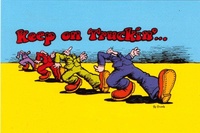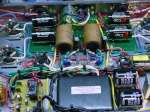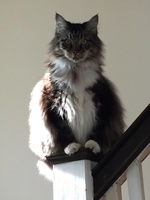+3
GP49
arledgsc
deepee99
7 posters
When tube power just isn't enough ...

deepee99- Posts : 2244
Join date : 2012-05-23
Location : Wallace, Idaho

arledgsc- Posts : 504
Join date : 2012-11-30
Just what I need and a great price... A 10,000 watt amp for a mere $209.00. What could be wrong here? 

deepee99- Posts : 2244
Join date : 2012-05-23
Location : Wallace, Idaho
I was thinking if it wasn't quite up to stuff as a VTA-grade amp, those of us in the northern climes could use one to un-thaw our pipes with in the winter. Oh, wait, solid-state amps aren't fond of a direct short.arledgsc wrote:Just what I need and a great price... A 10,000 watt amp for a mere $209.00. What could be wrong here?

GP49- Posts : 792
Join date : 2009-04-30
Location : East of the sun and west of the moon
With no standards by which the output power is stated, and the power output taken from the two channels, bridged as a single mono signal, it's probably actually a 50 wpc stereo amplifier by continuous average sine wave power measurement.

deepee99- Posts : 2244
Join date : 2012-05-23
Location : Wallace, Idaho
GP49 wrote:With no standards by which the output power is stated, and the power output taken from the two channels, bridged as a single mono signal, it's probably actually a 50 wpc stereo amplifier by continuous average sine wave power measurement.
Ya think that much?

arledgsc- Posts : 504
Join date : 2012-11-30
From Amazon ad for the same product.... Single ended input impedance is only 10K ohm. Must be class "double Ds" amplification to have that kind of efficiency.
Power Handling:
3065 watts @ 2 ohms
2125 watts @ 4 ohms
1350 watts @ 8 ohms
10,000 watts peak power
https://www.amazon.com/Technical-Pro-LZ10K-Professional-2-Channel/dp/B01DSH4I1I
Power Handling:
3065 watts @ 2 ohms
2125 watts @ 4 ohms
1350 watts @ 8 ohms
10,000 watts peak power
https://www.amazon.com/Technical-Pro-LZ10K-Professional-2-Channel/dp/B01DSH4I1I

deepee99- Posts : 2244
Join date : 2012-05-23
Location : Wallace, Idaho
Sarcasm aside, what practicable use is something like this?
I know they use ridiculously high-powered Class D subwoof amps but assume those are just for transients. Not sure I'd want to hear a stringed section at high SPLs through one of these, though . . . Still, they must have some application.
I know they use ridiculously high-powered Class D subwoof amps but assume those are just for transients. Not sure I'd want to hear a stringed section at high SPLs through one of these, though . . . Still, they must have some application.

arledgsc- Posts : 504
Join date : 2012-11-30
A reviewer tested the amp and stated it only puts out 200W/ch. RMS into a 2 ohm load with 5% THD. The bass was OK but the highs very strident. Best used he could think of would be a sub-woofer or public address system as it really wasn't "hi-fi".

Peter W.- Posts : 1351
Join date : 2016-08-07
Location : Melrose Park, PA
deepee99 wrote:Sarcasm aside, what practicable use is something like this?
I know they use ridiculously high-powered Class D subwoof amps but assume those are just for transients. Not sure I'd want to hear a stringed section at high SPLs through one of these, though . . . Still, they must have some application.
Class D amps, in my direct experience, are very common for sound reinforcement and band use in smaller venues. Also for 'ambient noise' applications - bars, restaurants, stores and such. Five-Below installed such a system in a one of their stores in a shopping center I managed.
Cheap, reliable, and where HiFi does not matter, excellent for the purpose.
Tongue firmly in cheek: There are those who believe that tubes are best used 'when HiFi does not matter'.

j4570- Posts : 150
Join date : 2010-08-30
Manufacturer says 600W RMS
https://www.tpro.com/products/lz10k
At least that is believable since the input cord is 120V 15A plug (i.e., about 1800 watts). Otherwise, this amp would be at least 500% efficient...........Nowhere does it say how many amps it actually pulls.
find me something that makes power at a 5 to 1 ratio, and I'm set for life....
https://www.tpro.com/products/lz10k
At least that is believable since the input cord is 120V 15A plug (i.e., about 1800 watts). Otherwise, this amp would be at least 500% efficient...........Nowhere does it say how many amps it actually pulls.
find me something that makes power at a 5 to 1 ratio, and I'm set for life....

wildiowa- Posts : 237
Join date : 2012-03-19
It was hard in the early band days to get an honest output rating for musical gear and we saw some pretty outrageous claims on guitar and bass amps...but nothing like this. We relied solely on the RMS watts, which I hope to God is still a reliable and honest rating. Now with the Class D stuff who knows. I see many newer Class D amps with thousands of watts on legitimate seller websites and some of the power ratings look pretty high...but nothing like this! 10k audio watts is clearly fantasy, especially at that price.
Which brings up another question I have always had. I used to power my PA system with a Citation II running two A-7 Voice of the Theater cabs. That was solid, unquestionable 60 watts of power on each side. Would a solid state amp rated at 60 watts RMS on each side achieve the same result? In other words, is one watt RMS of output driven by a 6550 the same as one watt RMS from a solid state amp? Is a Class D watt the same as a Class A watt? Seems the Citation always blew other stuff away, even higher powered solid state amps of that day, but I realize they certainly also have different sonic characteristics that need to be considered.
Similarly, a top of the line solid state Vox Beatle was rated at 240 watts RMS. Compare that to a Marshall Major, rated 200 watts (4-KT88's), and it was NO comparison...it just stomped the Vox. I mean stomped it. I always wondered how all that worked. I thought a watt, was a watt!
Which brings up another question I have always had. I used to power my PA system with a Citation II running two A-7 Voice of the Theater cabs. That was solid, unquestionable 60 watts of power on each side. Would a solid state amp rated at 60 watts RMS on each side achieve the same result? In other words, is one watt RMS of output driven by a 6550 the same as one watt RMS from a solid state amp? Is a Class D watt the same as a Class A watt? Seems the Citation always blew other stuff away, even higher powered solid state amps of that day, but I realize they certainly also have different sonic characteristics that need to be considered.
Similarly, a top of the line solid state Vox Beatle was rated at 240 watts RMS. Compare that to a Marshall Major, rated 200 watts (4-KT88's), and it was NO comparison...it just stomped the Vox. I mean stomped it. I always wondered how all that worked. I thought a watt, was a watt!

deepee99- Posts : 2244
Join date : 2012-05-23
Location : Wallace, Idaho
Another spec that is always suspicious is any distortion rating.
I remember the Phase Linear 700 had near-perfect ratings at 700 watts but horrible distortion (IM, THD, signal/noise etc.,) at lower power levels. Maybe it was the zip-cord they used to plug it in with.
Leave it to ol' Bob Carver . . .
I remember the Phase Linear 700 had near-perfect ratings at 700 watts but horrible distortion (IM, THD, signal/noise etc.,) at lower power levels. Maybe it was the zip-cord they used to plug it in with.
Leave it to ol' Bob Carver . . .

wildiowa- Posts : 237
Join date : 2012-03-19
Ah, I have an old Phase Linear 400 in the basement I got as part of an equipment swap. It is clear every transistor has been changed at least once..maybe twice...three times? Four?? And recall the old Peavey PS800. 800 watts, absolutely bulletproof like a military build I dropped mine 8 feet off a truck on hard concrete and it still worked....but TERRIBLE distortion and noise...but for live performance and driving those dumb Bose Panaray 800's, who cared?

GP49- Posts : 792
Join date : 2009-04-30
Location : East of the sun and west of the moon
Crossover (notch) distortion was legendary in those amplifiers. The two halves of the Class B waveform didn't match precisely at the zero-crossover. The amount of distortion (by amplitude) was essentially the same for all power outputs but was a greater percentage the lower the output, so it was worst at low levels where most actual listening happens, accounting for the terrible sound of those amplifiers. The late Jim Bongiorno strove to eliminate this problem in high power transistor amplifiers. His first major effort, the Dynaco Stereo 400, was much improved if properly set up. The actual procedure was to observe crossover distortion on an oscilloscope while adjusting idle current in the driver stage of the amplifier, while driving it at low power; crossover distortion was to be "adjusted out." Some "margin of safety" had to be allowed for in amplifiers sold as kitbuilds, to prevent too much heat buildup caused by excessive idle current; so they didn't sound QUITE so good when completed by an average builder, as an amplifier that came out of the factory, or better, that went onto the test bench of a competent technician for precise readjustment after completion. Bongiorno's various Ampzilla amplifiers had complex circuitry for controlling idle current; unfortunately, some of them used integrated circuits that are now of Unobtainium, and others were supplied only with proprietary identification, though most have been "decoded" by now.
The crossover distortion problem is of less concern in the tube amplifiers we discuss on this forum when the output stage is properly adjusted, because they are designed as Class AB amplifiers, operating at Class A, which has no crossover distortion, at low power; they are in Class B at higher power where this kind of distortion is less audible. But adjusting them for idle current (colloquially called "bias") that is too low, thus operating the amplifier in Class B, will cause crossover distortion to appear.
The crossover distortion problem is of less concern in the tube amplifiers we discuss on this forum when the output stage is properly adjusted, because they are designed as Class AB amplifiers, operating at Class A, which has no crossover distortion, at low power; they are in Class B at higher power where this kind of distortion is less audible. But adjusting them for idle current (colloquially called "bias") that is too low, thus operating the amplifier in Class B, will cause crossover distortion to appear.
Last edited by GP49 on Fri May 26, 2017 2:41 am; edited 1 time in total

Kentley- Posts : 496
Join date : 2015-03-06
Age : 72
Location : Worcester, MA
GP49, your explication is exemplary - one of the clearest summations of an "electronic Phantom Menace" given on this forum. 

